


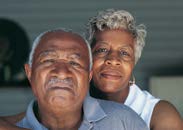





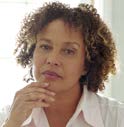
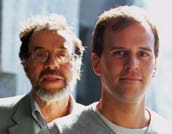
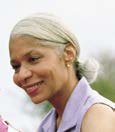

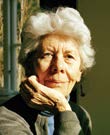


Facing Forward
Life After Cancer Treatment
National Cancer Institute
U.S. DEPARTMENT
OF HEALTH AND
HUMAN SERVICES
National Institutes
of Health
A Note About Cancer Survivors
There are almost 14 million people in the U.S. today who are cancer survivors. Three out of every four American families will have at least one family member diagnosed with cancer.
To help support survivors’ unique needs, the National Cancer Institute (NCI) formed the Office of Cancer Survivorship (OCS) in 1996. The office is dedicated to enhancing the length and quality of life of people with cancer. OCS also promotes research that looks at the long- and short-term effects of cancer and its treatment. For more information about survivorship issues and
OCS, visit online at http://cancercontrol.cancer.gov/ocs/.
Acknowledgments
We would like to offer a sincere thank you to the extraordinary survivors who contributed to the development and review of
this booklet.
NCI extends a special thanks to the following researchers for their pivotal work in the area of cancer survivorship under NCI Grant No. CA63018. Facing Forward was adapted from materials used in the study, Moving Beyond Cancer.
■■ Patricia A. Ganz, M.D., Professor, UCLA Schools of Medicine and Public Health and Division of Cancer Prevention &
Control Research, Jonsson Comprehensive Cancer Center,
Los Angeles, CA
■
■ Beth Leedham, Ph.D., Clinical Psychologist, private
practice, Encino, CA
■
■ Beth E. Meyerowitz, Ph.D., Professor, Department
of Psychology, University of Southern California,
Los Angeles, CA
This booklet is also available in Spanish
(visit http://www.cancer.gov or call 1-800-4-CANCER).
Este folleto también se puede obtener en español.
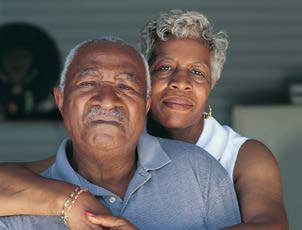
Facing Forward
Life After Cancer Treatment
“While I was having chemo, I quit doing
almost everything. So when treatment
ended, the challenge for me was, what
am I going to do now with my life?
What should I go back to doing?” —LEN

Now that treatment is over …
Many cancer survivors have told us
that while they felt they had lots
of information and support during
Who is a survivor?
their illness, once treatment stopped,
they entered a whole new world—
This booklet uses the term “cancer
one filled with new questions.
survivor” to include anyone who
This booklet was written to share
has been diagnosed with cancer,
common feelings and reactions that
from the time of diagnosis through
many people just like you have had
the rest of his or her life. Family
after treatment ended.
members, friends, and caregivers
are also part of the survivorship
It also offers some practical tips to
experience.
help you through this time. Use
this booklet in whatever way works
You may not like the word, or you
best for you. You can read it from
may feel that it does not apply to
beginning to end. Or you can just
you, but the word “survivor” helps
refer to the section you need.
many people think about embracing
their lives beyond their illness.
This booklet shares what we have
learned from other survivors about
life after cancer: practical ways of
dealing with common problems and guidelines for managing your physical, social, and emotional health. When possible, we include specific information from research with cancer survivors.
While cancer is a major event for all who are diagnosed, it brings with it the chance for growth. As hard as treatment can be, many cancer survivors have told us that the experience led them to make important changes in their lives.
Many say they now take time to appreciate each new day. They also have learned how to take better care of themselves and value how others care for them. Others draw from their experience to become advocates to improve cancer research, treatment, and care.
We hope that this booklet will serve as a resource and inspiration to you as you face forward to your life after cancer.
For ease of reading, rather than listing the many professionals that you may see as part of your medical care, you’ll find the term “doctor” used in the booklet to describe all medical interactions.
Table of Contents
Congratulations on Finishing Your Cancer Treatment ..... 1
What Is “Normal” After Treatment? ........................................................... 1
Getting Follow-up Medical Care ....................................... 2
What Is Follow-up Care? ............................................................................. 3
Which Doctor Should I See Now? How Often? .......................................... 5
A Survivor’s Wellness Plan .......................................................................... 5
Talking With Your Doctor ........................................................................... 7
Questions About Your Follow-up Plan ...................................................... 10
Guidelines for Follow-up Care .................................................................. 11
Ways To Manage Physical Changes ................................. 15
Fatigue ....................................................................................................... 16
Memory and Concentration Changes ...................................................... 18
Pain ............................................................................................................ 20
Nervous System Changes (Neuropathy) ................................................... 23
Lymphedema or Swelling .......................................................................... 24
Mouth or Teeth Problems ......................................................................... 26
Changes in Weight and Eating Habits ...................................................... 28
Trouble Swallowing ................................................................................... 29
Bladder or Bowel Control Problems .......................................................... 29
Menopause Symptoms .............................................................................. 30
Body Changes and Intimacy ............................................ 32
Your Feelings .................................................................. 37
Social and Work Relationships ....................................... 49
Reflection ........................................................................ 55
Appendix ......................................................................... 56
Financial and Legal Matters ...................................................................... 56
Resources ................................................................................................... 57
Learning To Relax ...................................................................................... 60
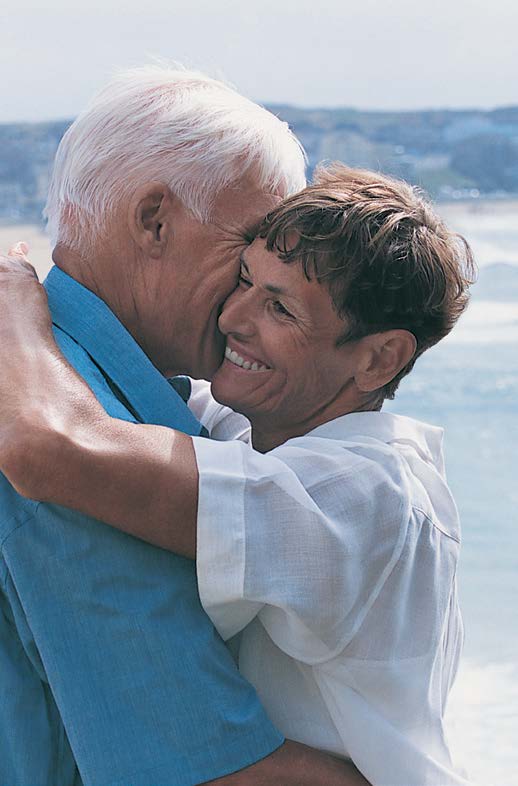

I thought when I’d finished
treatment—when they looked at
my tests and they said it looked
good—I thought, OK, I’m done.
But now I’m starting to realize
that it’s not over.” —JANE
Congratulations on Finishing
Your Cancer Treatment
The end of cancer treatment is often a time to rejoice. You are probably relieved to be finished with the demands of treatment and are ready to put the experience behind you. Yet at the same time, you may feel sad and worried.
It’s common to be concerned about whether the cancer will come back and what you should do after treatment.
When treatment ends, you may expect life to return to the way it was before you were diagnosed with cancer. But it can take time to recover. You may have permanent scars on your body, or you may not be able to do some things you once did easily. Or you may even have emotional scars from going through so much. You may find that others think of you differently now—or you may view yourself in a different way.
One of the hardest things after treatment is not knowing what happens next.
“Because the doctors and nurses never told
me what to expect, I had very unrealistic
expectations of wellness, and so did my
family and friends. This led to a great deal
of worry.” —BOB
What Is “Normal” After Cancer Treatment?
Those who have gone through cancer treatment describe the first few months as a time of change. It’s not so much “getting back to normal” as it is finding out what’s normal for you now. People often say that life has new meaning or that they look at things differently now. You can also expect things to keep changing as you begin your recovery.
Your new “normal” may include making changes in the way you eat, the things you do, and your sources of support, all of which are discussed in this booklet.
1
Getting Follow-up Medical Care
All cancer survivors should have follow-up care. Knowing what to expect after cancer treatment can help you and your family make plans, lifestyle changes, and important decisions.
Some common questions you may have are:
■
■ Should I tell the doctor about symptoms that worry me?
■
■ Which doctors should I see after treatment?
■
■ How often should I see my doctor?
■
■ What tests do I need?
■
■ What can be done to relieve pain, fatigue, or other problems after treatment?
■
■ How long will it take for me to recover and feel more like myself?
■
■ Is there anything I can or should be doing to keep cancer from coming back?
■
■ Will I have trouble with health insurance?
■
■ Are there any support groups I can go to?
Coping with these issues can be a challenge. Yet many say that getting involved in decisions about their medical care and lifestyle was a good way for them to regain some of the control they felt they lost during cancer treatment.
Research has shown that people who feel more in control feel and function better than those who do not. Being an active partner with your doctor and getting help from other members of your health care team is the first step.
If you don’t have health insurance, Medicare, or Medicaid, you may feel that some of the information in this booklet won’t be helpful to you. You may have already struggled just to get treated and now see follow-up care as another battle. It can be hard to get care if you don’t have good medical coverage, but you must make sure you continue to get the care you need—especially now that treatment is over.
There may be resources in your community to help you get these services.
Talk with your doctor, social worker, or the business office at your local hospital or clinic. There are also organizations listed in the Resources
section on page 57 that may be able to help you with health care costs.
2
Follow-up Medical Care
What Is Follow-up Care?
Once you have finished your cancer treatment, you should receive a followup cancer care plan. Follow-up care means seeing a doctor for regular medical checkups. Your follow-up care plan depends on the type of cancer and type of treatment you had, along with your overall health. It is usually different for each person who has been treated for cancer.
In general, survivors usually return to the doctor every 3 to 4 months during the first 2 to 3 years after treatment, and once or twice a year after that. At these visits, your doctor will look for side effects from treatment and check if your cancer has returned (recurred) or spread (metastasized) to another part of your body.
At these visits, your doctor will:
■
■ Review your medical history
■
■ Give you a physical exam
Your doctor may run follow-up tests such as:
■■ Blood tests
■■ MRI or CT scans. These scans take detailed pictures of areas inside the body at different angles.
■■ Endoscopy (en-DOSS-koh-pee). This test uses a thin, lighted tube to examine the inside of the body.
At your first follow-up visit, talk with your doctor about your follow-up care plan.
See page 11 for a list of organizations and programs that give follow-up care guidelines for survivors or Resources on page 57 for a detailed list of cancer-related organizations.
Follow-up care can also include home care, occupational or vocational therapy, pain management, physical therapy, and support groups. (See pages
12–13 for a description of these services.) 3


Medical Records and Follow-up Care
Be sure to ask your oncologist for a written summary of your treatment. In the summary, he or she can suggest what aspects of your health need to be followed. Then, share this summary with any new doctors you see, especially your primary care doctor, as you discuss your follow-up care plan.
Many people keep their medical records in a binder or folder and refer to them as they see new doctors. This keeps key facts about your cancer treatment in the same place. Other kinds of health information you should keep include:
■
✔ The date you were diagnosed
■
✔ The type of cancer you were treated for
■
✔ Pathology report(s) that describe the type and stage of cancer
■
✔ Places and dates of specific treatment, such as:
• Details of all surgeries
• Sites and total amounts of radiation therapy
• Names and doses of chemotherapy and all other drugs
• Key lab reports, x-ray reports, CT scans, and MRI reports
■
✔ List of signs to watch for and possible long-term effects of treatment
■
✔ Contact information for all health professionals involved in your treatment and follow-up care
■
✔ Any problems that occurred during or after treatment
■
✔ Information about supportive care you received (such as special medicines, emotional support, and nutritional supplements)
Be sure to give any new doctors
that you see a copy of
your treatment summary or
medical records.
4
Which Doctor Should I See Now? How Often?
You will need to decide which doctor will provide your follow-up cancer care and which one(s) you will see for other medical care. For follow-up cancer care, this may be the same doctor who provided your cancer treatment. For regular medical care, you may decide to see your main provider, such as a family doctor. For specific concerns, you may want to see a specialist. This is a topic you can discuss with your doctors. They can help you decide how to make transitions in care.
Depending on where you live, it may make more sense to get follow-up cancer care from your family doctor, rather than your oncologist. It’s important to note that some insurance plans pay for follow-up care only with certain doctors and for a set number of visits.
In coming up with your schedule, you may want to check your health insurance plan to see what follow-up care it allows. No matter what your health coverage situation is, try to find doctors you feel comfortable with.
Always tell any new doctors you see about your history of cancer. The type of cancer you had and your treatment can affect decisions about your care in the future. They may not know about your cancer unless you tell them.
A Survivor’s Wellness Plan
After cancer treatment, many survivors want to find ways to reduce the chances of their cancer coming back. Some worry that the way they eat, the stress in their lives, or their exposure to chemicals may put them at risk.
Cancer survivors find that this is a time when they take a good look at how they take care of themselves. This is an important start to living a healthy life.
When you meet with your doctor about follow-up care, you should also ask about developing a wellness plan that includes ways you can take care of your physical, emotional, social, and spiritual needs. If you find that it’s hard to talk with your doctor about these issues, it may be helpful to know that the more you do it, the easier it becomes. And your doctor may suggest other members of the health care team for you to talk with, such as a social worker, clergy member, or nurse. For tips on talking with your doctor, see pages 7–9.
5

Changes You May Want To Think About Making
■
✔ Quit smoking. Research shows that smoking can increase the chances of getting cancer at the same site or another site.
■
✔ Cut down on how much alcohol you drink. Research shows that drinking alcohol increases your chances of getting certain types of cancers.
✔■ Eat well. Healthy food choices and physical activity may help reduce the risk of cancer or recurrence. Talk with your doctor or a nutritionist to find out about any special dietary needs that you may have. The American Cancer Society and the American Institute for Cancer Research have developed similar diet and fitness guidelines that may help reduce the risk of cancer:
• Eat a plant-based diet and have at least 5–9 servings of fruit and vegetables daily. Try to include beans in your diet, and eat whole grains (such as cereals, breads, and pasta) several times daily.
• Choose foods low in fat and low in salt.
• Get to and stay at a healthy weight.
For more tips on nutrition and healthy eating, go to http://www.aicr.org
and click on “Cancer Survivors,” or go to http://www.cancer.org and click on “Survivors.”
■
✔ Exercise and stay active. Several recent reports suggest that staying active after cancer can help lower the risk of recurrence and can lead to longer survival. Moderate exercise (walking, biking, swimming) for about 30 minutes every—or almost every—day can:
• Reduce anxiety and depression
• Improve mood and boost self-esteem
• Reduce fatigue, nausea, pain, and diarrhea
It is important to start an exercise program slowly and increase activity over time, working with your doctor or a specialist (such as a physical therapist) if needed. If you need to stay in bed during your recovery, even small activities like stretching or moving your arms or legs can help you stay flexible, relieve muscle tension, and help you feel better. Some people may need to take special care in exercising.
Talk with your doctor before you begin any exercise program.
6
Talking With Your Doctor
During cancer treatment, you had a lot of practice in getting the most out of every doctor’s visit. These same skills now apply to you as a survivor and are especially helpful if you are changing doctors or going back to a family or primary care doctor you may not have seen for a while.
It is important to be able to talk openly with your doctor. Both of you need information to manage your care. Be sure to tell your doctor if you are having trouble doing everyday activities, and talk about new symptoms to watch for and what to do about them. If you are concerned that the treatment you had puts you at a higher risk for having health problems, be sure to discuss this with your doctor as you develop your follow-up plan.
At each visit, mention any health issues you are having, such as:
■
■ New symptoms
■
■ Pain that troubles you
■
■ Physical problems that get in the way of your daily life or that bother you, such as fatigue, trouble sleeping, sexual problems, or weight gain or loss
■
■ Other health problems you have, such as heart disease, diabetes, or arthritis
■
■ Medicines, vitamins, or herbs you are taking and other treatments you are using
■■ Emotional problems, such as anxiety or depression, that you may have now or that you’ve had in the past
■■ Changes in your family’s medical history, such as relatives with cancer
■■ Things you want to know more about, such as new research or side effects
Just because you have certain symptoms, it doesn’t always mean the cancer has come back. Symptoms can be due to other problems that need to be addressed.
7
Considering Complementary and Alternative Medicine
Complementary and alternative medicine includes many different healing approaches that people use to prevent illness, reduce stress, prevent or reduce side effects and symptoms, or control or cure disease. An approach is generally called “complementary” when it is used in addition to treatments prescribed by a doctor. When it is used instead of treatments prescribed by a doctor, it is often called “alternative.” Research has shown that more than half of all people with a history of cancer use one or more of these approaches.
Some common methods include imagery or relaxation (see page 60),
acupressure and massage, homeopathy, vitamins or herbal products, special diets, psychotherapy, prayer, yoga, and acupuncture.
Even though you have finished your cancer treatment, if you are thinking about using any of these methods, discuss it with your doctor or nurse first.
Some complementary and alternative therapies may interfere or be harmful when used with medicines normally prescribed by a doctor. For more information, see the Resources section on page 57 to order the NCI brochure Thinking About Complementary & Alternative Medicine: A Guide for People With Cancer. You can also go to NCI’s Office of Cancer Complementary and Alternative Medicine at http://www.cancer.gov/cam.
Asking About Your Family’s Ca


























